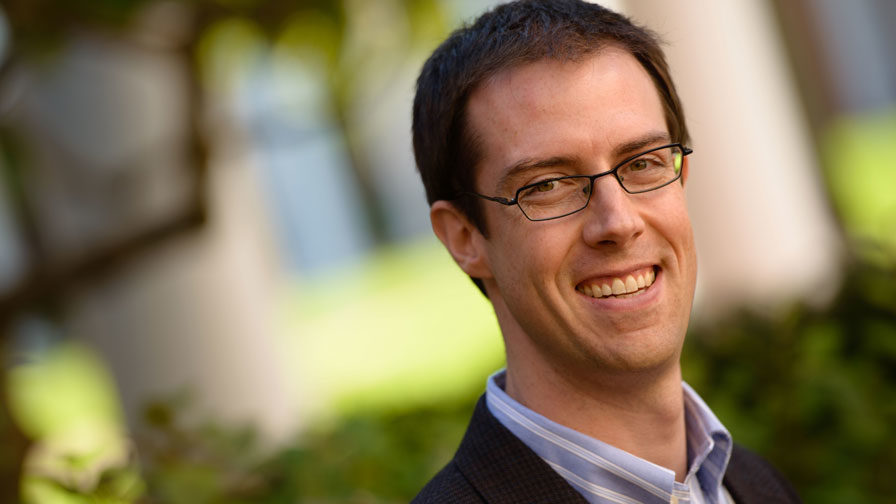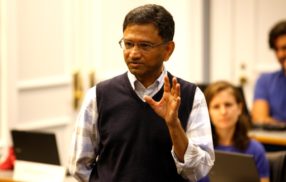
Q&A: UVA Darden Professor Dan Murphy Helps Students Make Sense of the Macroeconomy
By Dave Hendrick
University of Virginia Darden School of Business Professor Dan Murphy’s research tackles some of the most pressing macroeconomic questions and debates of the modern era, considering topics such as the effect of fiscal stimulus on inequality and tools to enable the government to borrow money without adding to government debt. Named the Jung Family Associate Professor of Business Administration in 2021, Murphy recently spoke about his research and its impact, teaching at Darden, and the interplay between the two. Endowed professorships, like those supported by John (MBA ’84) and Connie Jung help Darden attract and retain outstanding faculty and empower the faculty to teach and conduct research at the highest level. The Jung professorship is specifically intended for an emerging scholar and honors the professors John Jung and four of his children had at Darden.
An edited transcript of the conversation is below.
Can you describe some of your recent research?
One recent theoretical paper tries to understand the impact of COVID-19 on the macroeconomy. When there’s suddenly a pandemic, we know that’s going to naturally shrink the economy. The question we ask is: Under what condition can that shrink the economy past efficient levels?
We know people stopped going to restaurants, so there’s less spending on restaurants, initially. But under what conditions do people stop spending on things they could still spend money on that are unrelated to health concerns — because that’s inefficient and you probably don’t want that to happen. So we propose different fiscal policies that give you the most bang for your buck to get the economy back up to an efficient level.
One thing we predicted in that model was that there was going to be a surge in inflation once many restrictions subsided, and we’re seeing that.
Another project I’m working on now is trying to understand the effects of government spending. Prior research, including my own, has asked, if the government spends a dollar, how much more output does it create? We’re looking at defense spending and considering, when the U.S. Department of Defense spends a dollar, what’s the effect on social outcomes beyond just GDP or employment. We’re looking at outcomes such as incidence of disability, poverty rates, divorces rates, mortality and a range of social outcomes. We’re considering indirect implications of defense spending.
Another paper considers how, when we get into a recession, what’s the best way to get out of a recession quickly. Traditionally, we have focused on monetary policy. We look to the Federal Reserve —the United States’ central bank. When we hit a recession, they lower interest rates and that stimulates the economy. That worked fine for 2001, but when 2008 came and our recessions became bigger and deeper, the central bank could only lower interest rates so much before they had to start doing quantitative easing and other extraordinary measures.
When interest rates are close to zero, it’s tough for monetary policy to do much more, so people look to fiscal policy to do the heavy lifting in the form of government spending. But government spending has a constraint, and that constraint is debt.
My co-author and I have a working paper that proposes a way to stimulate the macroeconomy during the recession without accumulating government debt. The basic idea is that once interest rates get close to zero, right now the Federal Reserve effectively prints money and they inject it into the economy by buying bonds. What if, instead of trading assets, they said to the U.S. Treasury, “Here are dollars that we just created, go spend them?” Then the treasury could go and engage in direct spending, and it wouldn’t increase debt because they essentially got that money for free. They could stimulate the economy much quicker. The Federal Reserve would need to be careful to ensure that their money-financed spending does not cause excess inflation, and in our paper we propose bounds on how much money could be printed to ensure that does not happen.
How do you think your research informs the classroom experience?
We present to students a logical framework for understanding the macroeconomy, and the macroeconomy has so many moving and interrelated parts that I think the big challenge as an instructor is to simplify it into something that is coherent but still useful. In my research, I do a lot of theoretical work that tries to boil a lot of the macroeconomy down to its essential and important components. And I study a lot of empirical relationships, especially around the effects of government spending, and that sheds light on the fundamental relationships in the macroeconomy.
So when I go into the classroom, I try to take a lot of insights from both my theoretical and empirical work to inform the model that we teach in the first part of the core Global Economies and Markets course. In other words, the model we teach the students, while simple, in many dimensions is also consistent with the empirical evidence that I and other researchers have uncovered.
How is the research support at Darden?
I think the trajectory is strongly upward. To give you one example, previously, if there was something I wanted to look into, I would probably ask for money to buy a data set. Now, the Institute for Business in Society has good researchers who can gather data and do a lot of the initial upfront work and help prepare data sets for me. That saves a ton of time and allows me to focus on writing, course development and thinking about new projects.
What does it mean to you that Darden alumni like John Jung (MBA ’84) are willing to endow professorships to support emerging scholars such as yourself?
I’m really grateful to have the support and be recognized. I believe there is a bigger research budget, and if not for COVID I could use that to travel to more conferences. That’s one of the nicest things in terms of practical implications.
How do you describe the Darden experience to prospective faculty peers?
This is fresh on my mind because we just hired a wonderful person from the Federal Reserve. The selling point for Darden is, it’s great to be a teacher here. You get to teach applicable, real-world material and you get to see the students change the way they view the world in real-time. Economics is sometimes taught as memorizing curves and lines, and we do it very differently here. Yes, we have a framework, but we ask them to run the world through the framework and analyze policy choices. We make it relevant to students and their day-to-day lives. When they read the news about the macroeconomy, they’re able to interpret it, understand it and have an opinion about it. It’s really fun to be involved in that process for the students.
If you want to simply go to class and lecture and then go back to your office, Darden is probably not the place for you.
The University of Virginia Darden School of Business prepares responsible global leaders through unparalleled transformational learning experiences. Darden’s graduate degree programs (MBA, MSBA and Ph.D.) and Executive Education & Lifelong Learning programs offered by the Darden School Foundation set the stage for a lifetime of career advancement and impact. Darden’s top-ranked faculty, renowned for teaching excellence, inspires and shapes modern business leadership worldwide through research, thought leadership and business publishing. Darden has Grounds in Charlottesville, Virginia, and the Washington, D.C., area and a global community that includes 18,000 alumni in 90 countries. Darden was established in 1955 at the University of Virginia, a top public university founded by Thomas Jefferson in 1819 in Charlottesville, Virginia.
Press Contact
Molly Mitchell
Senior Associate Director, Editorial and Media Relations
Darden School of Business
University of Virginia
MitchellM@darden.virginia.edu






